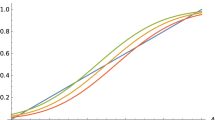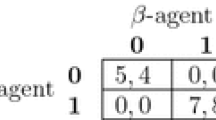Abstract
Coordination games often have multiple equilibria. The selection of equilibrium raises the question of belief formation: how do players generate beliefs about the behavior of other players? This article takes the view that the answer lies in history, that is, in the outcomes of similar coordination games played in the past, possibly by other players. We analyze a simple model in which a large population plays a game that exhibits strategic complementarities. We assume a dynamic process that faces different populations with such games for randomly selected values of a parameter. We introduce a belief formation process that takes into account the history of similar games played in the past, not necessarily by the same population. We show that when history serves as a coordination device, the limit behavior depends on the way history unfolds, and cannot be determined from a-priori considerations.
Similar content being viewed by others
References
Angeletos G.-M., Hellwig C., Pavan A. (2007) Dynamic global games of regime change: Learning, multiplicity, and the timing of attacks. Econometrica 75: 711–756
Berger U. (2008) Learning in games with strategic complementarities reviseted. Journal of Economic Theory 143: 292–301
Billot A., Gilboa I., Samet D., Schmeidler D. (2005) Probabilities as similarity-weighted frequencies. Econometrica 73: 1125–1136
Burdzy K., Frankel D. M., Pauzner A. (2001) Fast equilibrium selection by rational players living in a changing world. Econometrica 69: 163–189
Carlsson H., van Damme E. (1993) Global games and equilibrium selection. Econometrica 61: 989–1018
Edmond, C. (2008). Information manipulation, coordination and regime change, mimeo
Gilboa I., Matsui A. (1991) Social stability and equilibrium. Econometrica 59: 859–867
Gilboa I., Lieberman O., Schmeidler D. (2006) Empirical similarity. Review of Economics and Statistics 88: 433–444
Gilboa, I., Postlewaite, A., & Schmeidler, D. (2011). Rationality of belief, or: Why Savage’s axioms are neither necessary nor sufficient for rationality. Synthese, forthcoming.
Hofbauer J., Sigmund K. (1998) Evolutionary games and replicator dynamics. Cambridge University Press, Cambridge
Hume D. (1748) An enquiry concerning human understanding. Clarendon Press, Oxford
Jehiel P. (2005) Analogy-based expectation equilibrium. Journal of Economic Theory 123: 81–104
Judd K. (1985) The law of large numbers with a continuum of random variables. Journal of Economic Theory 35: 19–25
Kandori M., Mailath G. J., Rob R. (1993) Learning, mutation, and long run equilibria in games. Econometrica 61: 29–56
Katz M., Shapiro C. (1986) Technology adoption in the presence of network externalities. Journal of Political Economy 94: 822–841
Krishna, V. (1992). Learning in games with strategic complementaties. HBS Working Paper 92-073, Harvard University.
LiCalzi M. (1995) Fictitious play by cases. Games and Economic Behavior 11: 64–89
Lohmann S. (1994) The dynamics of informational cascades: The monday demonstrations in Leipzig, East Germany, 1989–1991. World Politics 47: 42–101
Matsui A., Matsuyama K. (1995) An approach to equilibrium selection. Journal of Economic Theory 65: 415–434
Monderer D., Shapley L. S. (1996) Fictitious play property for games with identical interests. Journal of Economic Theory 68: 258–265
Muller E. N., Opp K.-D. (1986) Rational choice and rebellious collective action. The American Political Science Review 80: 471–488
Robinson J. (1951) An iterative method of solving a game. The Annals of Mathematics 54: 296–301
Schelling T. (1960) The strategy of conflict. Harvard University Press, Cambridge, MA
Steiner J., Stewart C. (2008) Contagion through Learning. Theoretical Economics 3: 431–458
van Damme, E. (1983) Refinements of the Nash equilibrium concept. Lecture Notes in Economics and Mathematical Systems, vol. 219. Springer Verlag, Berlin
Weinstein J., Yildiz M. (2007) A structure theorem for rationalizability with application to robust predictions of refinements. Econometrica 75: 365–400
Young H. P. (1993) The evolution of conventions. Econometrica 61: 57–84
Author information
Authors and Affiliations
Corresponding author
Rights and permissions
About this article
Cite this article
Argenziano, R., Gilboa, I. History as a coordination device. Theory Decis 73, 501–512 (2012). https://doi.org/10.1007/s11238-011-9264-5
Published:
Issue Date:
DOI: https://doi.org/10.1007/s11238-011-9264-5




